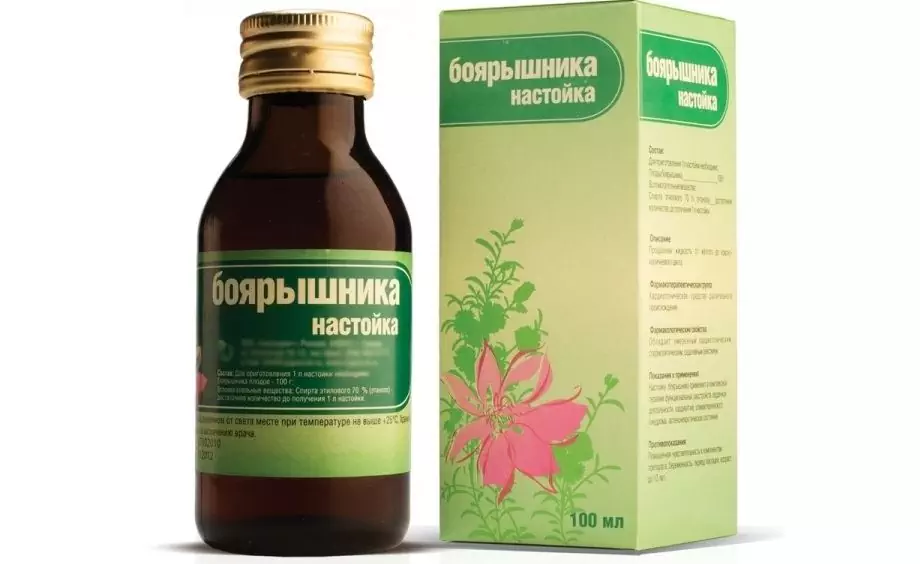- Author Rachel Wainwright wainwright@abchealthonline.com.
- Public 2023-12-15 07:39.
- Last modified 2025-11-02 20:14.
Overdose of hawthorn tincture
Hawthorn tincture is a phytopreparation with moderate cardiotonic, antispasmodic and sedative effects. It is used in the complex therapy of cardialgia, climacteric syndrome, astheno-neurotic conditions and hypertension.
Despite the low toxicity of the drug, taking the tincture in high doses leads to the development of an overdose.

Source: vrbiz.ru
How much hawthorn tincture is needed for an overdose?
Unless otherwise prescribed by the doctor, the hawthorn tincture is taken 3-4 times a day, 20-30 drops, dissolved in a small amount of water. The course of treatment is no more than a month, followed by a break. If necessary, after a break, therapy can be continued.
The exact amount of the drug leading to an overdose has not been determined, since it depends on the individual characteristics of the patient (age, weight, body condition, etc.). Overdose cases were recorded when taking more than 100 drops (2.5 ml).
Hawthorn tincture should be taken with caution simultaneously with β-blockers (Anaprilin, Biprol, Kordanum) and cardiac glycosides (Strofantin, Korglikon, Digoxin), as they potentiate each other's action. Joint reception of hawthorn tincture and β-blockers is often accompanied by a sharp decrease in blood pressure, up to the development of collapse. The combination of tincture and cardiac glycosides leads to an increase in the cardiotonic effect (a decrease in the excitability of the heart muscle with a simultaneous increase in its contractile function).
Hawthorn tincture is an alcohol-containing agent. People suffering from alcoholism often use it for the purpose of alcoholic intoxication, drinking a bottle (25 ml) at a time, and sometimes several. This is the most common cause of severe overdose.
Signs of overdose
Overdose of hawthorn tincture is characterized by:
- nausea;
- dizziness;
- general weakness, drowsiness;
- decreased heart rate (bradycardia);
- lowering blood pressure.
Severe overdose causes an abnormal heart rhythm (arrhythmia).

Source: depositphotos.com
First aid for overdose with hawthorn tincture
If signs of an overdose appear, it is necessary to immediately call an ambulance team, and only then proceed to provide first aid to the victim.
- Take a suspension of activated charcoal (grind the drug at the rate of 1-2 tablets for each kg of body weight into powder and mix with ½ glass of water) or any other drug with an absorbing effect, such as Enterosgel or Smectu.
- Take a saline laxative (magnesium sulfate, Karlovy Vary laxative salt).
You should not wash the stomach, because:
- hawthorn tincture is very quickly absorbed from the gastrointestinal tract into the bloodstream;
- vomiting increases cardiac arrhythmia due to increased parasympathetic tone.
Antidote
There is no specific antidote to hawthorn tincture.
When is medical attention required?
In case of an overdose of hawthorn tincture, medical attention should be sought in all cases and as soon as possible. You cannot rely on the fact that the symptoms of poisoning are not too pronounced, and hope that they will go away on their own - a critical violation of the cardiovascular system can occur at any time.
During treatment, a normal heart rate is restored (Isoprenaline, Atropine, etc.). Therapy of possible electrolyte disorders and disorders of the functions of vital organs is carried out.
Extracorporeal detoxification methods (hemosorption, forced diuresis with alkalization of urine, hemodialysis, plasmapheresis) are ineffective in this case.
Possible consequences
An overdose of hawthorn tincture is especially dangerous for young children and patients with heart disease. This is due to the increased sensitivity of their heart muscle to the action of the drug - even a therapeutic dose can lead to serious violations of the contractile function of the myocardium, which is a life-threatening condition.
Long-term uncontrolled use of hawthorn tincture by persons suffering from alcoholism leads to persistent dysfunction of the cardiovascular system. In such conditions, any subsequent administration of the drug can provoke an acute attack of bradycardia, up to cardiac arrest.
YouTube video related to the article:

Elena Minkina Doctor anesthesiologist-resuscitator About the author
Education: graduated from the Tashkent State Medical Institute, specializing in general medicine in 1991. Repeatedly passed refresher courses.
Work experience: anesthesiologist-resuscitator of the city maternity complex, resuscitator of the hemodialysis department.
The information is generalized and provided for informational purposes only. At the first sign of illness, see your doctor. Self-medication is hazardous to health!






